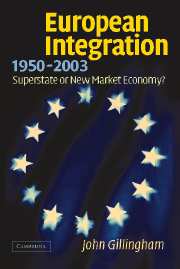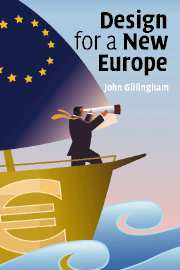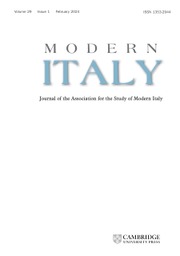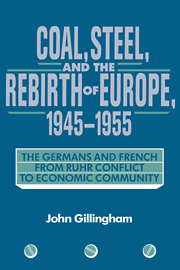European Integration, 1950–2003
Integration is the most significant European historical development in the past fifty years, eclipsing in importance even the collapse of the USSR. Yet, until now, no satisfactory explanation is to be found in any single book as to why integration is significant, how it originated, how it has changed Europe, and where it is headed. Professor Gillingham's work corrects the inadequacies of the existing literature by cutting through the genuine confusion that surrounds the activities of the European Union, and by looking at his subject from a truly historical perspective. The late-twentieth century has been an era of great, though insufficiently appreciated, accomplishment that intellectually and morally is still emerging from the shadow of an earlier one of depression, and modern despotism. This is a work, then, that captures the historical distinctiveness of Europe in a way that transcends current party political debate.
- This is the first book to explore the significance of integration in Europe
- Looks at how integration originated and developed, and how it continues to change Europe
- Covers the entire sweep of integration history
Reviews & endorsements
"John Gillingham's fascinating history of European integration brings out the shifts of gears, changes of direction and divergent impulses that brought the European Union to its present established but contested shape as the triumph of market over state. Gillingham wanted his book to 'trumpet like an elephant,' and it does. To extend his metaphor, it gores any number of sacred cows, from the myths of the Founding Fathers and of American benevolence to the European social model. It will stimulate lively and constructive debate."
Robert O. Paxton, Columbia University
"John Gillingham is the preeminent American historian of the European Union. His book builds on vast scholarly knowledge to provide the first full-length history of European integration from the Second World War to the present day."
Charles S. Maier, Harvard University
"Professor John Gillingham's sweeping reinterpretation of European integration since 1950 is informed, provocative, and fresh. It combines a deep appreciation of the market incentives that have made European cooperation inevitable, a subtle account of the ideologies and diplomatic circumstances that shaped its precise form, and a sharp Hayekian critique of the policy choices that were made. It is sure to generate scholarly debate for years to come."
Andrew Moravcsik, Harvard University
"John Gillingham has produced an excellent, up-to-date history of the EU which overturns many preconceived ideas and challenges the views of Eurofanatics and Eurosceptics alike. It is a dazzling performance, full of paradoxes and ironies and some very funny lines. If anyone wants to know what little actually works in the EU and why, this is the book to read. It is acidly critical yet economically rational. It leaves the usual hagiographical histories of European bureaucracy way behind. Every student of post-war Europe will have to come to terms with it. It is an astounding achievement."
Alan Sked, Department of International History, London School of Economics, formerly Convener of European Studies
"The European Union is very difficult to write about, because it can be bewilderingly technical, and at the same time invites windy rhetoric. It takes immense familiarity with the subject - and particular knowledge of what are still very different countries - to write a book both accessible and worth reading. John Gillingham has succeeded. This is a book that will be of great use at any level - politicians wishing to make serious speeches, teachers needing to put together a course, or just travellers in an aircraft. I am in the author's debt."
Norman Stone, Director of the Turkish-Russian Institute, Bilkent University, Ankara, formerly of Oxford University
"Gillingham has written the first comprehensive history of European integration and produced a profoundly original reinterpretation of this enormously complex process."
John P. McKay, University of Illinois, Urbana
"...impressive and engaging... The reader closes this book-length discourse ... with the certitude of having gained knowledge and insight into the workings and rocky foundations of the European experiment."
Business History Review
"John Gillingham has written an entertaining and informative history of European integration...[His] book breaks many conventions of historical and academic writing. It is bold in its scope and in its trans disciplinary methodological approach taken to its topic...It is a lively read with lots of political history detail. I recommend it."
Jeffrey Sommers, Andre Gunder Frank, Journal of World History
Product details
February 2005Adobe eBook Reader
9780511075049
0 pages
0kg
This ISBN is for an eBook version which is distributed on our behalf by a third party.
Table of Contents
- Part I. A German Solution to Europe's Problems? The Early History of European Communities, 1950–1965: Introduction to part one: a new global setting
- 1. The liberal project for an integrated Europe
- 2. The rise and decline of monetarism
- 3. More or less liberal Europe: the institutional origins of integration
- 4. All or nothing? The founding of the EEC and the ending of an era, 1958–1966
- Conclusion of part one: Needed: a new integration scenario
- Part II. From Embedded Liberalism to Liberalism - A Step Forward: European Integration and Regime Change in the 1970s: Introduction to part two: a new European situation
- 5. Realm of theory to sphere of action
- 6. Better than muddling through
- Conclusion of part two: needed: a new integration theory
- Part III. Seeking the New Horizon: European Integration from the Single European Act to the Maastricht Treaty: Introduction to part three: a new realm of possibility
- 7. Forces of change, forces of resistance
- 8. Thatcherism, and the reform of Britain
- 9. The crisis of the welfare state and the challenge of modernization in Europe in the 1980s
- 10. Maastricht ho! by air, land, or SEA?
- 11. The Delorean agenda
- Conclusion of part three: Needed: a new integration direction
- Part IV: A False Dawn? Challenge and Promise in Europe of the 1990s: Introduction to part four: a new global framework
- 12. Almost a road to nowhere
- 13. No open and shut cases: member-states and the European community in the 1990s
- 14. Shrinking enlargement: betrayal of a pledge or new opportunity?
- 15. The new market economy and Europe's future
- Conclusion to part four: Needed: a new European Union?





.jpg)
.jpg)

